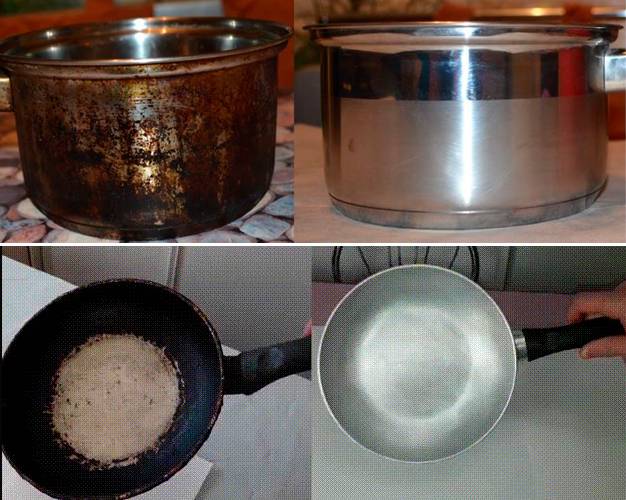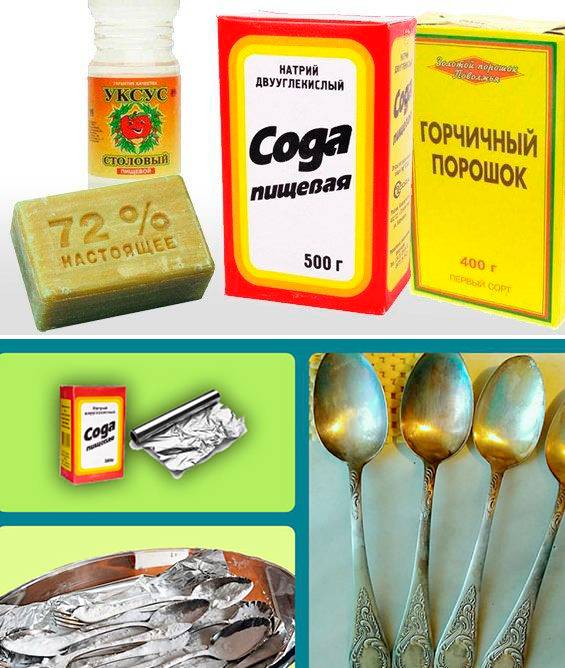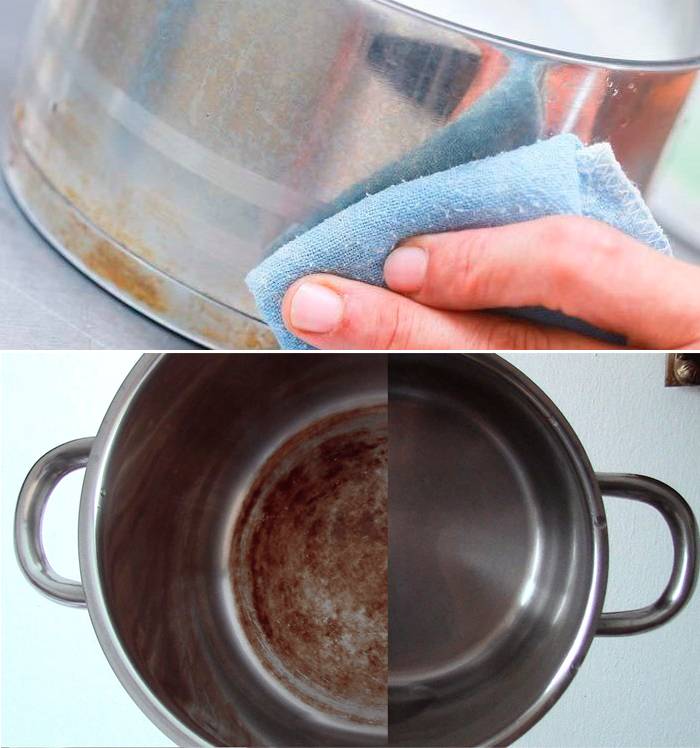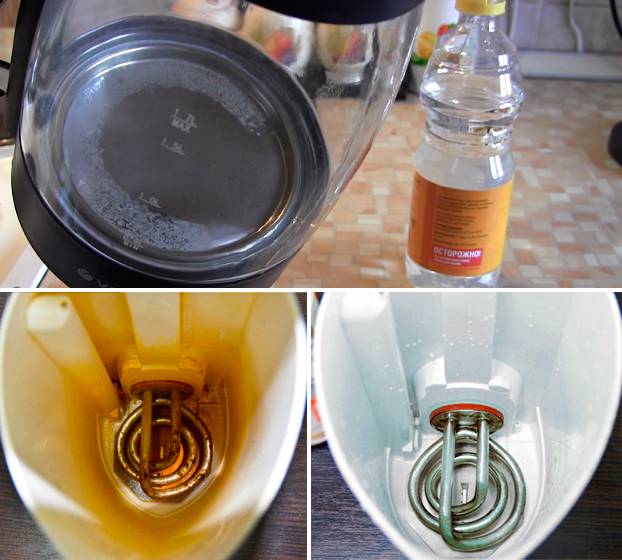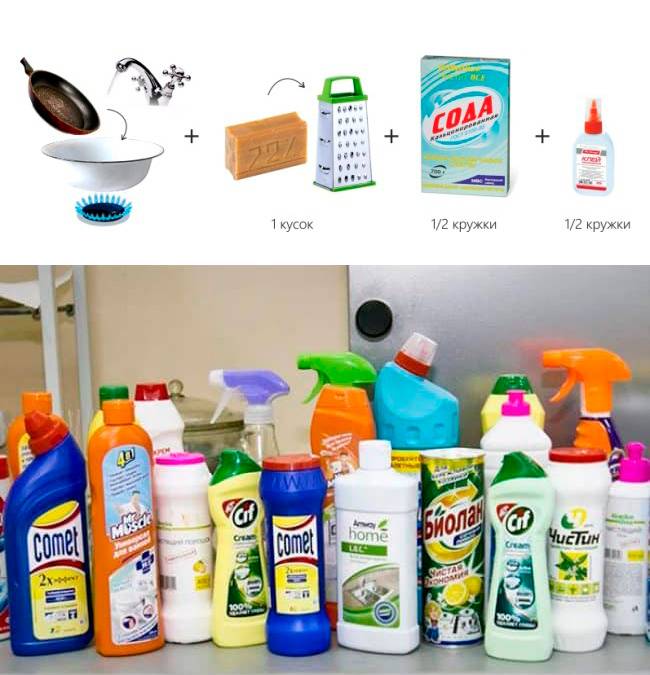Cookware often loses its original appearance during prolonged use. The main reason is the carelessness of the housewives. Distracted for a moment, we do not notice how the pan burns up and hard-to-remove carbon deposits form at the bottom. Being late, we do not have time to wash or soak the dishes, the result is dried stains. There are many sources of pollution in the kitchen. Consider the most effective and proven cleaning methods.
Instead of modern cleaning products for washing kitchen utensils, experienced housewives recommend using century-tested products:
- an apple or potato;
- activated carbon;
- toothpaste and silicate glue;
- ammonia and hydrogen peroxide;
- soda and vinegar;
- ordinary salt;
- citric acid;
- laundry soap.
The choice of product depends on the type of contamination.
Getting rid of fat
Traces of grease on the surface of dishes are common. Getting rid of them is quite simple if you follow some recommendations.
Wait for the cooking utensils to cool down, this is very important! When hot, fat can be absorbed into the surface and will be much more difficult to remove.
Mustard powder effectively copes with fat, wash the dishes with it, then rinse everything thoroughly with water. Aluminum dishes can be washed by pouring water into them, adding lemon juice and vinegar in equal doses. Boil the resulting solution for 20 minutes. Drain the solution, let the dishes cool. Then wash with normal soapy water.
To clean cutlery, place it in a boiling pot, fill it with water and add citric acid. Simmer over high heat for 10-15 minutes. After wiping everything thoroughly with a sponge, rinse the devices and dry them.
To clean the meat grinder from the greasy residue left after the meat, scroll the raw potatoes. Then rinse all parts well.
For example, in field conditions in the fight against fat, ordinary tea bags will come to the rescue. Take a few sachets and wipe down the pan.
Removing scale
If hard water runs in your apartment, then sooner or later scale will appear on the dishes. To give the teapot its original appearance, boil apple peels or rhubarb stalks in it.
The coffee pot will regain its original shine if you boil water with citric acid or lemon wedges in it.
Aluminum cookware is more prone to limescale deposits. For strong plaque, boil the utensils in soapy water, adding baking soda and silicate glue. With a less pronounced layer, ammonia will come to the rescue. Mix it with baking soda and laundry soap, dilute everything in water. Wipe the container walls with the resulting solution. Then rinse everything thoroughly. You can also use vinegar, add 120 ml to water, boil for 15-20 minutes. Rinse the dishes thoroughly under running water.
Removing the burn
Allow the dishes to cool before cleaning. Provided that the carbon deposit has not had time to be absorbed, you can get rid of it with a soapy solution. Rub a small bar of laundry soap into 40 ° C water. Dip the contaminated container into the resulting solution, wait 30 minutes. After that, all stains are easily removed.
For heavy soot, follow these steps. Dissolve shavings of soap, 120 g of silicate glue and 300 g of soda in 10 liters of water. Boil the dishes in this solution for 4 minutes. Rinse everything thoroughly, let dry.
Pour salt and soda into a bowl with burnt food particles, fill with water. Simmer for half an hour over low heat. Let cool completely, then drain the solution. Wash as usual, all dirt can be easily wiped off.
Another effective way. Cut up fresh potatoes. Dip half in baking soda and wipe the surface of the dishes with it.It takes a little work, but the result is worth it.
We clean kitchen utensils from different materials
Next, let's look at what tools are best used for different surfaces.
Aluminum kitchen utensils
If aluminum cookware is not used properly, it will quickly lose its aesthetic appearance. Do not clean while hot, the container must cool completely. Otherwise, the cooking utensils may warp or darken.
A paste of ammonia and shavings of soap is an effective remedy. Salmon perfectly dissolves fatty compounds. It is often used to clean the oven. With the resulting paste and hot water, wipe the aluminum dishes. After that, immediately rinse everything well.
To restore the previous shine to the darkened dishes, use kefir or cucumber pickle. Wipe the surface of the container with the solution, and leave for a couple of hours, then rinse everything well. If the inside darkens, pour kefir inside for 4 hours. Rinse thoroughly.
Stainless steel kitchen utensils
The most popular material in the kitchen. Rust and corrosion stains can form on the surface if not handled properly. It is not recommended to wash stainless steel in the dishwasher, the most effective way is to wash it in warm water by hand. Be sure to wipe everything dry, otherwise you risk seeing new stains. When cleaning, do not use abrasive products or hard sponges, as this may damage the coating.
You can remove fumes from pots by spreading a thick layer of toothpaste on it. Leave it on for a couple of minutes, then wash it off with cold water. Let the dishes dry.
Various stains can be removed by wiping them first with vegetable oil, then with a sponge dipped in vinegar. We wash everything off thoroughly - there is no trace of stains!
For a pristine shine, wipe the surface with raw potato wedges.
Enamelled utensils
If you can't wash the dishes right away, soak them in warm water. This will prevent food particles from drying and dirt from sticking into the surface. Then you can easily wash off all the dirt with water and a regular dishwashing detergent. Burnt food must not be peeled off with sharp objects, as this will break the enamel coating.
Take a glass of baking soda, pour it into a bucket of water, and put the dirty dishes in there. We put everything on the fire and boil for half an hour, with persistent dirt - an hour. After turning off the heat, let the dishes cool, leaving them in the solution. Rinse everything thoroughly. The dishes will be like new!
Dissolve 6 tablespoons of salt in a liter of water. Pour into a saucepan and put on fire. Simmer for 40 minutes over low heat. After washing everything off, you will see how not a trace remained of the yellow coating.
Pour water into the enameled utensils and dissolve a bag of citric acid. Boil for 20 minutes. Rinse well. The dark coating will disappear.
Glass utensils
Housewives love to use such utensils. It does not absorb odors and is not afraid of rust and scale.
Crumple a piece of foil well to make a sponge prototype. Use a stream of warm water to clean the dishes with the addition of liquid soap. In this way, you can easily get rid of carbon deposits.
Dissolve a few teaspoons of mustard powder in warm water, lower the dirty utensils there for 5-10 minutes. We take it out, first wipe it with a dry cloth, then wash it well with soap and rinse. Cannot be washed with mustard solution itself.
Dissolve a teaspoon of ammonia in a liter of water. Wipe the glassware with the resulting solution. Rinsing is unnecessary.
Soak stubborn stains in warm water, then scrub vigorously with baking soda for a couple of minutes. Then wash with soap and water.
Young potatoes can easily cope with light stains. Wipe glass plates with cut slices. Bottles can be washed by dropping the tuber pieces inside the rind. All stains are washed vigorously under running water.
How to clean a cast iron skillet
To get rid of a long-term layer of carbon deposits in an old cast iron skillet, the following method will help you. You will need powerful, concentrated detergents.
- Apply a thick layer of the product, put the dishes in a bag or bag so that the product does not dry out quickly;
- Let the utensils lie like this for several days;
- We wash well;
- We repeat everything one more time. Chemicals will dissolve the entire carbon layer;
- The next step: rinse the pan well and soak it in a 1: 1 vinegar solution, leave in it for an hour;
- Remove carbon residues with a metal brush.
- rinse well and wipe.
Using all the recipes, your kitchen utensils will always look like new. It will serve you for more than a dozen years.

